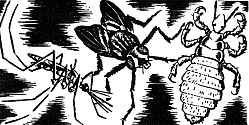|
|
|
59. D.D.T.
A Radio Talk by Charles F. Kettering
War has always been a scourge. It not only
destroys lives and property in a direct manner through shot, shell,
bombs and fire but it often leaves in its wake death and disease in
many other forms. Among these, typhus has probably been the greatest
killer, and, malaria, another destroyer, offers a constant menace
because of its prevalence in the tropics. The cause of these threats to
human life are the many insects that carry disease. In contrast to
other great conflicts, we hear little about the loss of life due to
pestilence in this war. Why is this?
As in so many cases we won't find the answer
in one of today's scientific discoveries. Here we shall have to go back
more than seventy years and look over the shoulder of a chemical
student, Othmar Zeidler, performing an experiment in Strasbourg. Young
Zeidler on this particular day in 1874 produced a new chemical which he
recorded in his notes as dichlorodiphenyl trichloroethane - D.D.T. for
short. But he saw no use for it, and the formula lay dormant in the
records of the Chemical Society for sixty-five years.
|
|









